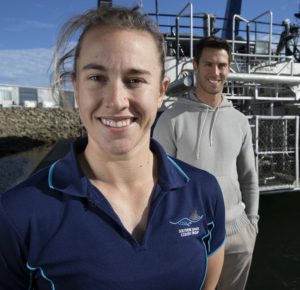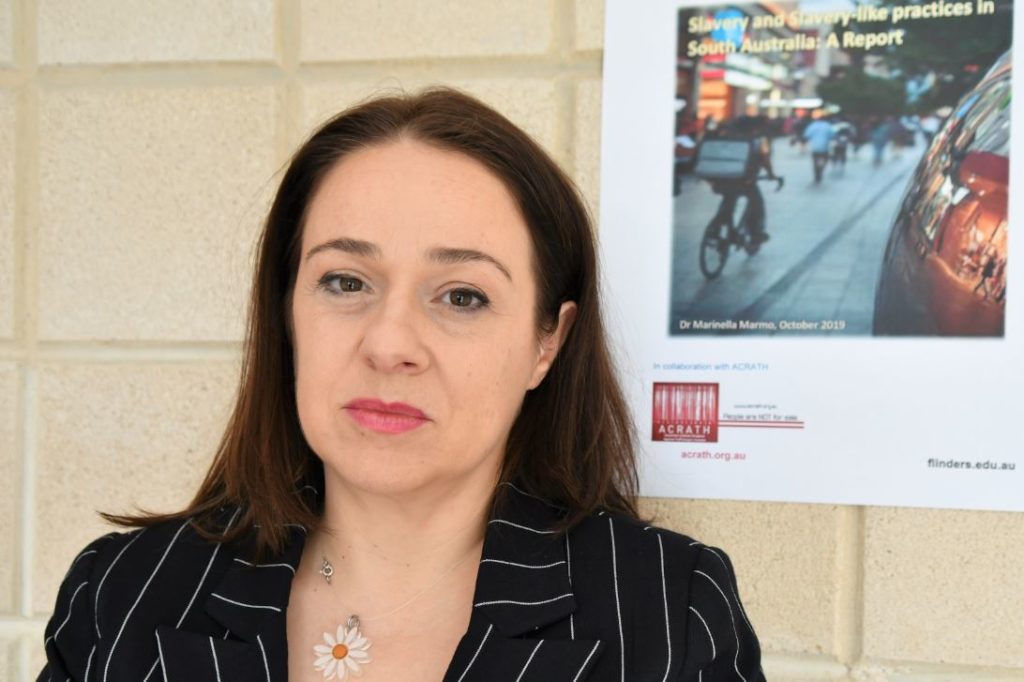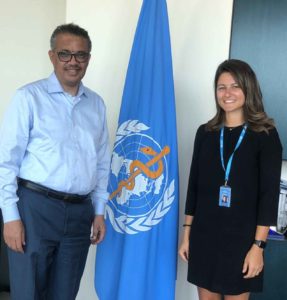
Celebrated surfer Mick Fanning joins researchers in shark doco airing next week, alumnus policeman wins hearts, human trafficking motion for Parliament thanks to Flinders researcher, and a pandemic internship to remember.
Celebrated surfer joins researchers in shark doco airing next week

A new documentary including the research of Associate Professor Charlie Huveneers and his team will air on Wednesday September 15, on National Geographic Australia.
As shared in The Australian magazine recently, the show follows Mick Fanning as he joins research trips with scientists and shark conservationists across the world, including going cage-diving with Professor Huveneers and great whites off Port Lincoln.
Save This Shark airs on National Geographic Australia, September 15.
Policeman wins hearts
The talents of high-ranking Victoria Police officer, Flinders alumnus Luke Cornelius, have long been recognised through his distinguished career with the Australian Federal Police and Victoria Police, and the straight-speaking cop is increasingly winning community votes also.
Renowned for his tough stance on crime combined with his frank and personalised communication style, Assistant Commissioner Cornelius’s criticism of Victorians planning anti-lockdown protests at a press conference on 28 August earned him praise across the nation.
The avalanche of twitter responses illustrated much appreciation, including:
“Love the plain speaking of Asst Comm Luke Cornelius describing anti mask protestors “ boofheads”, “tin foil hat wearing brigade” and “batshit crazy”
“I laughed so hard. I love this straight talking cop. Can we please see him every day at the Victoria press conference. He is a breath of fresh air!”
“This guy Luke Cornelius should be put in charge of everything.”

Human trafficking motion due for Parliament based on Flinders research
Opposition MP Katrine Hildyard is due to revive calls for an investigation into human trafficking in South Australia by tabling a motion in the House this week.
Based on a comprehensive report led by Flinders University criminology researcher Associate Professor Marinella Marmo, the Shadow Minister Ms Hildyard aims to formally establish a joint committee to examine slavery and slavery-like practices in SA.
Associate Professor Marmo‘s ACRATH (Australian Catholic Religious Against Trafficking in Humans)-supported report shed light on severe forms of exploitation akin to slavery taking place in Adelaide and regional South Australia, including forced marriage, domestic, sexual and labour servitude linked to partner visas and severe forms of labour exploitation akin to slavery.
Its one key recommendation was to set up a state inquiry into these matters.
“We hope an informed and evidence-based discussion involving all parties will address this issue,” says Associate Professor Marmo.
“Indeed COVID-19 has exacerbated these matters, with reports on serious violations akin to slavery.
“We have heard many accounts of international students who had been paid as little as $8 an hour and cannot ‘walk away’ due to a number of imperatives (from threats to lack of options in a COVID-19 devastated job market), meaning there is no free consent to the contractual arrangement.”
She says SA featured in the latest Australian Government’s Human Trafficking report (2016-2017) as having higher per-capita referrals by AFP to the Support for Trafficked People Program at a rate of one referral each 243,000 inhabitants.

An internship to remember

Flinders University Nutrition and Dietetics PhD candidate, Joyce Haddad, has just returned from Geneva, Switzerland, where she worked as an intern at the headquarters of the World Health Organization.
Ms Haddad had no idea she would be working with the agency during a global pandemic when she secured the position earlier this year.
“When COVID-19 struck, it was a rollercoaster ride. The first few weeks of teleworking were absolutely manic, as we had to develop a departmental COVID-19 working group to manage the asks of public nutrition within the context of the pandemic,” she says. Read more>

